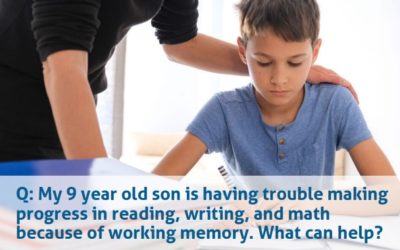What many tutors will have noticed is that many structured literacy strategies require frequent repetition because they focus remediation on tasks that are especially difficult for many dyslexic students – the automatic identification of the phonemes that make up words.
Not the Standard Track: Extracurriculars and Work Experience [Premium]
There are many ways of getting from A to Z and many of them don’t require a 4.0 GPA and elite school tracks. Dyslexics as a group may have trouble following the traditional route to their dream career because many of their academic strengths are late-blooming.
Fostering Creativity: The Early Life of Chuck Close [Premium]
Recently, I came across a paper, by Landmark College Professor Ken Gobbo, writing about the early life of artist Chuck Close – and this led me to an oral history recorded at the Smithsonian.
Dyslexia at Work: Dyslexia-Friendly Hiring? [Premium]
Research suggests that work teams that have at least one neurodiverse member are likely to be 30% more productive, but many companies have hiring practices that may exclude neurodiverse candidates before they are able to demonstrate their strengths.
Organization with Automation using ChatGPT [Premium]
ChatGPT is an AI or Artificial Intelligence-based program that can interact with you like a human in back-and-forth conversation. For dyslexic creatives, the potential to help with organization is immense. There are cautions about the technology, but also tremendous opportunities. FREE CHAT GPT vs PAID Currently using the free version of ChatGPT can give you a brief idea of how to communicate with the program, but information doesn’t stay long in the free version (for instance some guidelines you gave it yesterday may not be kept) and answers are also much simpler. The paid version for individuals is currently $20 per month if paid annually. The $20 per month rate allows you 40 messages in three hours. An Enterprise membership is more expensive, but […]
Nick Koshnick: StoriedWork.com An AI Co-Pilot for Non-Linear Thinkers
Nick Koshnick is a Stanford PhD and seasoned entrepreneur who raised money from companies like Google and Andreessen, and then sold the company.. He's also dyslexic. Now, he's co-founded StoriedWork.com with business partner Frank Corrigan. Storied has been nicknamed...
What Can Help with Working Memory Limitations?
Q: My 9 year old son is having trouble making progress in reading, writing, and Math because of working memory. What can help? Working memory is a type of memory that allows us to temporarily hold information 'in mind' to be used for other cognitive tasks. Some people...
Krista Weltner’s New Children’s Books: Everyday Adventure with Molly and Dyslexia
Krista's 3-book series, Everyday Adventures with Molly and Dyslexia is now available in bookstores and online shops! These books are a wonderful way to talk to young children about dyslexia, the importance of self-advocacy, self-acceptance, and discovery of dyslexic...
Are There Any Group Activities That Benefit Dyslexic Students? [Premium]
Like non-dyslexic students, there can be a wide variations that exist between how students enjoy group activities. In general, extroverts love group activities, while introverts less so. But there are benefits from the selection of some activities that especially benefit dyslexic students. CREATE A POSITIVE CLASSROOM CULTURE FOR DIFFERENT LEARNERS First of all, it’s helpful to have a classroom culture that allows flexibility in learning and accepting of differences. Students can be encouraged to take a different approach while solving problems and demonstrating knowledge. A discussion about differences in learning at the beginning of the year can make students who know they learn differently, feel more welcome. Some teachers may also model their openness to solving problems or learning a different way. Offering students options […]
Dyslexia and Personal Relationships [Premium]
‘Dyslexic moments’ like in the BuzzFeed video with Becky and Corey may happen a lot depending on how significant dyslexia related challenges are. Besides car directions, there are little mistakes writing down phone numbers or addresses or jotting down notes. Supportive families know how to be flexible and roll with the unexpected. It’s not uncommon for people to wonder whether they should bring up their dyslexia as they get to know someone better. It’s not easy bringing up these things because it can call up all sorts of past memories of being in school and misunderstood, and chances are, a significant other may know little about dyslexia. Some people choose not to bring the subject up – while others may have not known they had […]
Teaching Geometry to Dyslexic Students [Premium]
“Henry Winkler… got his diploma in the mail only after taking the same geometry class eight times in a row over the course of four years, during the summers and regular school semesters, and finally passing with a D-.” — Alia Wong, “The MisEducation of the Fonz”, Atlantic Monthly It’s surprisingly hard to find research publications on teaching geometry to dyslexic students. One reason, suggested by Kay and Yeo in their book Dyslexia and Maths, is that numerical difficulties are more common among dyslexic students than geometric ones. They cite one study of 92 students followed over four years in which 50% failed to meet standards in Number Work, compared to 27% who missed for “Measure, Shape and Space.” That being said, because geometry is […]
What is ‘Explicit’ Instruction and Why Does It Help with Dyslexia? [Premium]
If you look at almost any evidence-based guidelines for students with dyslexia, you’ll see the word ‘explicit’ in how instruction is delivered. Merriam’s Dictionary defines explicit as: “fully revealed or expressed without vagueness, implication, or ambiguity; leaving no question as to meaning or intent.” WHY IS EXPLICIT INSTRUCTION FOR DYSLEXIC STUDENTS? Remember that people with dyslexia tend to store information in explicit or declarative memory – with episodic memory areas being especially active. Activities that non-dyslexic people seem to acquire more effortlessly – like recognizing printed words, writing by hand, or retrieving math facts – are difficult if not impossible to learn without explicit instruction. For example, many non-dyslexic people may learn grammatical structure just through encountering different sentences when they are reading; dyslexic students, […]

![MIND Strengths for Tutors: Material Reasoning [Premium]](https://www.dyslexicadvantage.org/wp-content/uploads/2024/04/Material-Reasoning-Premium-2-400x250.jpg)
![Not the Standard Track: Extracurriculars and Work Experience [Premium]](https://www.dyslexicadvantage.org/wp-content/uploads/2024/04/Extracurriculars-and-Work-Experience-Premium-1-400x250.jpg)
![Fostering Creativity: The Early Life of Chuck Close [Premium]](https://www.dyslexicadvantage.org/wp-content/uploads/2024/04/Fostering-Creativity-The-Early-Life-of-Chuck-Close-DAs-400x250.jpg)
![Dyslexia at Work: Dyslexia-Friendly Hiring? [Premium]](https://www.dyslexicadvantage.org/wp-content/uploads/2024/04/Dyslexia-at-Work-Dyslexia-Friendly-Hiring-Premium-1-400x250.jpg)
![Organization with Automation using ChatGPT [Premium]](https://www.dyslexicadvantage.org/wp-content/uploads/2024/03/Organization-with-Automation-Using-ChatGPT-400x250.jpg)



![Are There Any Group Activities That Benefit Dyslexic Students? [Premium]](https://www.dyslexicadvantage.org/wp-content/uploads/2024/02/Group-Classroom-Activities-400x250.jpg)
![Dyslexia and Personal Relationships [Premium]](https://www.dyslexicadvantage.org/wp-content/uploads/2024/02/Dyslexia-and-Relationships-400x250.jpg)
![Teaching Geometry to Dyslexic Students [Premium]](https://www.dyslexicadvantage.org/wp-content/uploads/2024/02/Teaching-Geometry-to-Dyslexic-Students-400x250.jpg)
![What is ‘Explicit’ Instruction and Why Does It Help with Dyslexia? [Premium]](https://www.dyslexicadvantage.org/wp-content/uploads/2024/02/What-is-Explicit-Instruction-and-Why-Does-It-Help-with-Dyslexia-b-400x250.jpg)













